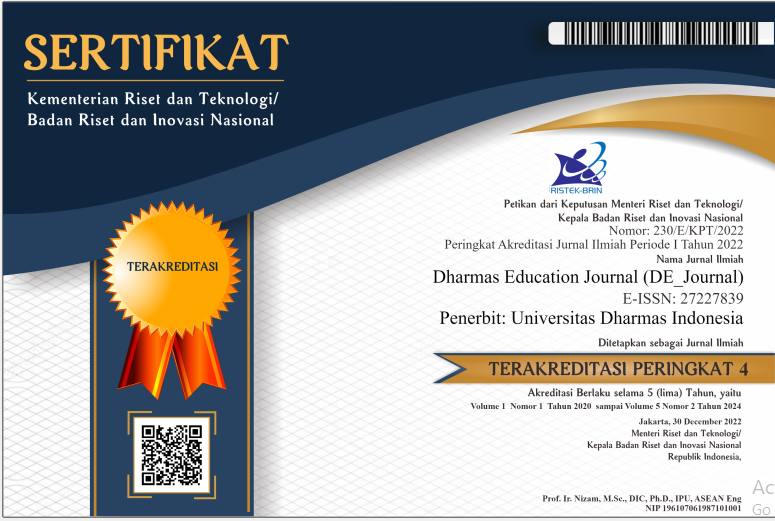CLASSROOM MANAGEMENT OF ENGLISH TEACHERS IN TEACHING ENGLISH AT VOCATIONAL HIGH SCHOOL
DOI:
https://doi.org/10.56667/dejournal.v5i2.1330Keywords:
Classroom Management, English TeacherAbstract
This research aims to understand how teachers implement classroom management principles in the teaching and learning process at SMKN 10 Bungo and why teachers implement these principles in their students' teaching and learning processes. practice. This type of research is qualitative research, where the data source is the result of classroom observations and interviews. The subjects of this research were three English teachers in grades ten, eleven and twelve. Collected data are grouped according to the research objective, then described and analyzed to get actual data. Research results show that not all English teachers at SMKN 10 Bungo fully apply the principles of classroom management in the teaching and learning process at 3 stages before the activity, during the activity and after the activity. Almost all classroom management principles are implemented during operation. Before and after the activity, teachers only followed three principles of classroom management: enthusiasm, enthusiasm, emphasizing positive things and promoting self-discipline. Research results also find out the reasons why teachers apply classroom management principles, specifically to increase student motivation and improve learning outcomes. Based on the results of this research, it can be concluded that classroom management principles have not been fully implemented by English teachers at SMKN 10 Bungo. Therefore, English teachers need to improve their knowledge of classroom management principles in teaching English. In the hope, this research can make a useful contribution to English teachers in education.
Downloads
References
Abdissamad, Z. (2021). Metode Penelitian Kualitatif (P. Rappanna, Ed.; 1st ed.).
Anwar, K., Ubaidillah, M & Sulistiyo, U. (2020). Exploring EFL Teacher’s Classroom Management: The Case of Indonesian Remote Secondory School. Journal of Language and Education, 22-35.
Arsyad Azhar. (2015). Media Pembelajaran (Ed. Revisis). Raja Grafindo Persada.
Best, B., & Thomas, W. (2008). The Creative Teaching And Learning. Bloo,sbury Academic.
Blitar, D. C. (2013). Effective Classroom Management and Instruction: A Knowledge Base for Consultation. National Association of School Psychologists.
Brown, H. D. (2004). Language Assessment: Principles and Classroom Practices. Longman.
Brown, H. D. (2007). Teaching by Principles: An Interactive Approach to Language Pedagogy (3rd ed.). Pearson Education.
Dyah. (2020). An Analysis of English Teachers’ Classroom Management at SMKN 3 Padang. Journal of English Language Teaching, 9.
J McLeod, J Fisher, & G Hoover. (2003). the key elements of classroom management. ASCD.
Kozma, R. B. (2012). Learning with Media . Sage Journal , 103–145.
Marzano, R., & Marzano. Jana. (2003). The Key to Classroom Management. Educational Leadership , 61(1), 1–11.
Moosa, M. S. (2015). Discipline– Improving Classroom Management through Action Research: A Professional Development Plan. Hamdard University.
Rido, A., Nambiar, R.M.K., Ibrahim, N. (2016). Teaching and Classroom Management Strategies of Indonesian Master Teacher: Investigating a Vocational English Classroom. The Southest Asian Journal of English Language Studies. Vol 22 (3) : 93-109
Sieberer-Nagler, K. (2015). Effective Classroom-Management & Positive Teaching. English Language Teaching, 9(1), 163. https://doi.org/10.5539/elt.v9n1p163
Sooriya, P. (2017). Non Verbal Communication . lulu publication.
Sugiyono. (2017). Metode penelitian kuantitatif kualitatif dan R dan D. Alfabeta.
Wong, H., & wong, R. (2022). THE Classroom Instruction Book . Harry wong publication.
Yasin, B., Mustafa, F., & Bina, A.M.S. (2022). Effective Classroom Management in English as A Foreign Language Classroom. Parole, 12 (1), 2022, 91-102
Downloads
Published
How to Cite
Issue
Section
License
Copyright (c) 2024 Dharmas Education Journal (DE_Journal)

This work is licensed under a Creative Commons Attribution-NonCommercial-NoDerivatives 4.0 International License.
Makalah yang disampaikan diasumsikan tidak mengandung bahan propietary yang tidak dilindungi oleh hak paten















